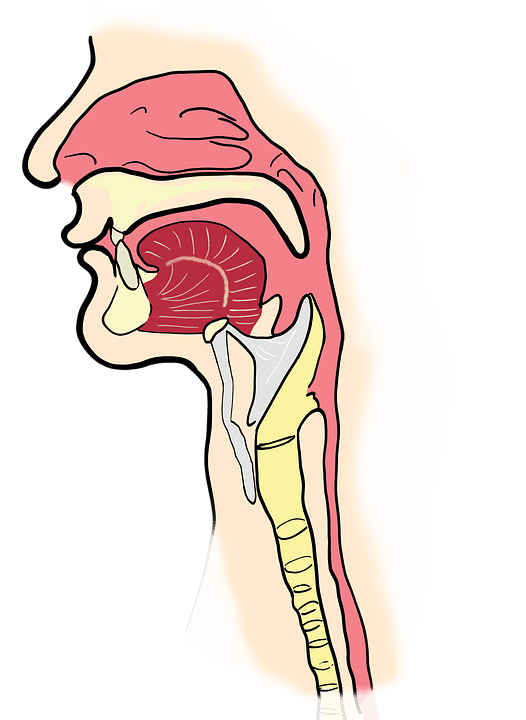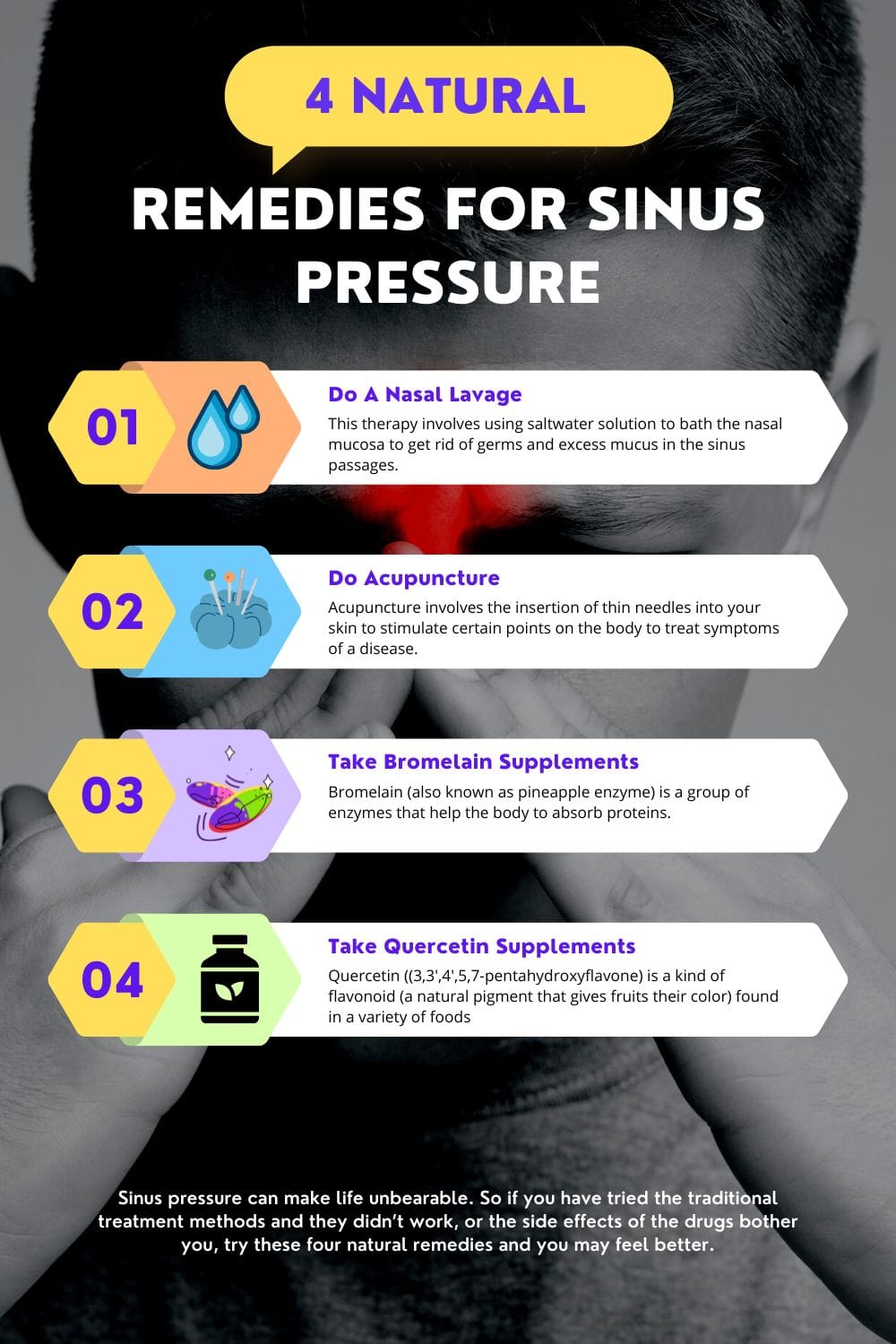Sinus pressure can make life uncomfortable. It can give you headaches, make your head feel heavy, make it difficult for you to breathe, and make it hard for you to sleep at night.
What Causes Sinus Pressure

There are hollow spaces in the bones of your head called sinuses. The membrane lining these sinuses produce mucus that traps germs in the air you inhale.
This mucus is usually swept by hair cells called cilia— tiny, hair-like structures that line the inside of the nasal and sinus cavities and drained—into your nasal cavity. However allergens and other environmental irritants, bacteria, and viruses may enter your sinuses, cause inflammation, and block them.
The blockage prevents the sinuses from draining properly. As a result, bacteria, viruses, and fungus live and multiply there and cause pain in your head, nose, and face.
The good news is that there are natural remedies for sinus pressure that can work to reduce sinus inflammation, swelling and other symptoms to ease the pressure and make you feel fine.

Here are some of them you can try.
Do A Nasal Lavage
This therapy involves using saltwater solution to bath the nasal mucosa to get rid of germs and excess mucus in the sinus passages.
Research To Back It
Some studies have found this remedy is effective in reducing sinus pressure. In one such study, when the nasal mucosa of the patients who had chronic sinus symptoms were irrigated with saline nasal irrigation, they reported a 64 % improvement in the symptoms. (1)
How It Will Help You
The nasal lavage will clear the mucus buildup to relieve that pressure.
It may also make it hard for allergens and irritants to cause inflammation to your nasal mucosa.
Furthermore, it will help increase the efficiency of the nasal drainage system—it will increase the speed with which the cilia move mucus containing allergens and irritants either forward to the nose so you blow it out or backward to the back of your throat so you swallow it (1).
How To Do It
What you will need: A nasal cup (also called a Neti pot), non-iodized salt and baked soda (which is recommended by The American Academy of Allergy, Asthma, and Immunology (AAAAI) ).
Procedure
- Mix 3 teaspoons of the salt with 1 teaspoon of baking soda.
- Boil 8 ounces (or one cup) of clean, distilled, sterilized water and let it cool until it’s lukewarm.
- Mix 1 teaspoon of the mixture in the cooled water.
- Fill the nasal cup.
- Lean over the sink in your bathroom and look straight into the basin.
- Tilt your head slightly.
- Gently insert the spout of the nasal cup into the upper nostril, close to the ceiling.
- Open your mouth and breathe through it.
- Raise the nasal cup and let the solution enter your upper nostril.
- The solution will flow out of your other nostril. If it flows into your throat, spit it out and blow your nostril.
- Refill the nasal cup and repeat the procedure on the other side.
Possible side effects
- Irritation in your nostrils
- A stinging sensation in your nostrils
- Nosebleeds
Caution
- Use sterile water. Boil whatever water you will use for the irrigation for at least three minutes. This will prevent a parasitic amoeba called Naegleria fowleri from entering your sinuses. This amoeba can cause a fatal brain infection if it enters your sinuses.
- Do not use sinus rinses if your nasal passageway is severely blocked.
How Often Do You Need to Use the Neti Pot?
In the study above, patients who were suffering from sinus problems found relief when they did the nasal lavage once a day. Some experts also say doing it twice a day in the morning and evening is effective.
Do Acupuncture

Young Chinese woman receiving acupuncture
Acupuncture involves the insertion of thin needles into your skin to stimulate certain points on the body to treat symptoms of a disease. It can help you if inflammation caused by allergens (also known as allergic rhinitis) is causing your sinus pressure.
Research To Back It
According to one review of many randomized controlled trials, acupuncture can help deal with allergen-induced inflammation in the nasal mucosa. However, more studies are needed to establish how acupuncture does this. (2)
What To Do
You can’t do it on your own at home. You will have to consult a trained, certified, licensed, experienced acupuncturist for him to do it for you.
There are a lot of acupuncture points across your body. In the study above, the points which were used for the treatment of the inflammation were:
- The large intestine 20 (LI20): It’s on both sides of the base of your nostrils.
- Yintang: It’s found between your eyebrows in the area just above the bridge of your nose (where your forehead connects to your nose).
- LI4 ( Hegu): It’s found in the groove between your thumb and your index finger.
- ST 36 (Zusanli): It’s found on the front of your right leg about 2 to 3 inches below your knee, on the outer side.
- EX-HN8 Shangyingxiang Bitong: It’s found at the upper ends of the grooves that run from the sides of your nose to the sides of your lips.
which the acupuncturist will stimulate to make energy flow through your body to help you get relief. (3)
Possible Side Effects
According to the National Center for Complementary and Integrative Health, acupuncture is safe if you see a trained acupuncturist who has a lot of years of experience under his belt. (4)
However if acupuncture isn’t done right or the needles used aren’t sterile, you may suffer serious side effects. These include infections, punctured organs, and injury to the central nervous system.
Some people experience mild side effects after doing it, including:
- nausea
- dizziness
- pain or tenderness around the involved areas
Caution
It’s also a great idea to avoid acupuncture if you:
- are pregnant (some points can make you go into labor).
- have a pacemaker (acupuncture needles sometimes use electric pulse).
- take blood thinners or have a bleeding disorder.
Take Bromelain Supplements
Bromelain (also known as pineapple enzyme) is a group of enzymes that help the body to absorb proteins. It is derived from pineapple juice and stem.

Research To Back It
A number of studies have shown bromelain is effective in solving sinus problems.
In one small study in which patients suffering from acute sinusitis were treated for three months with bromelain, it was found that it was effective in relieving the patients of their symptoms. (5)
And in another study, patients reported an improvement in some sinus symptoms when they took bromelain with Sinupret. (6)
How It May Help You
According to the Mount Sinai Hospital in New York, bromelain may help reduce the swelling, inflammation, and the amount of nasal mucus produced when you have sinus problems.
How Much To Take
There is no standard dosage. And recommended doses vary greatly. Generally, though, two dose ranges are commonly recommended:
- Taking 80–400 milligrams per serving, two to three times daily on an empty stomach.
- Taking 200— 400 mg three times a day on an empty stomach.
Possible side effects
- Stomach ache
- Diarrhea
- Nausea
- Vomiting
- Rapid heartbeat
- If you are a woman, you may experience heavy bleeding during menstruation
Caution
- Don’t take it if you are allergic to pineapple, carrots, rye, grass pollen, fennel, celery, latex, wheat, and bee venom.
- Don’t take bromelain if you are on a blood thinner, cancer drugs, antibiotics, sedatives, aspirin and NSAID painkillers.
Take Quercetin Supplements
Quercetin ((3,3′,4′,5,7-pentahydroxyflavone) is a kind of flavonoid (a natural pigment that gives fruits their color) found in a variety of foods including berries, cherries, green tea, broccoli, onions, and apples.
Flavonoids such as quercetin can work as an antioxidant. An antioxidant is a compound that scavenges free radicals— or unstable molecules that cause cell damage and inflammation when their levels in the body become too high — in your body to prevent or delay cell damage in the body thereby helping to reduce inflammation and allergy symptoms. (7)
Research To Back It
Quercetin will help reduce inflammation in your sinuses in other ways too. Studies done in a test tube, and on animals, revealed that quercetin may stop the action of enzymes that cause inflammation, as well as suppress the release of chemicals such as histamine that cause inflammation. (8, 9, 10)
How Much To Take
The recommended dose ranges between 500 and 1,000 mg three times a day.
It is safe to take on an empty stomach or with food.
Possible side effects
If you take more than 1,000 mg a day you may experience:
- Headaches
- Aches in your stomach
- Funny sensations
Caution
- Don’t take it if you are taking antibiotics and blood pressure drugs
- Don’t take it if you are pregnant or breastfeeding
It’s very important that you read the instructions on the labels of the bromelain and quercetin supplements before you take them. Optionally, discuss your intention to take them with your doctor before you purchase it.
Conclusion
Sinus pressure can make life unbearable. So if you have tried the traditional treatment methods and they didn’t work, or the side effects of the drugs bother you, try these four natural remedies and you may feel better.
Sources
- Rabago D, et al. (2009). Saline nasal irrigation for upper respiratory conditions. https://www.ncbi.nlm.nih.gov/pmc/articles/PMC2778074/
- Florian Pfab, et al. (2014). Acupuncture for allergic disease therapy–the current state of evidence. https://www.ncbi.nlm.nih.gov/pubmed/24881629
- Acupuncture: In Depth (2022). https://www.nccaom.org/wp-content/uploads/pdf/Acupuncture%20Relief%20Of%20Nasal%20Allergies%20Confirmed.pdf
- Acupuncture: In Depth(2016).https://nccih.nih.gov/health/acupuncture/introduction
- Büttner L, et al. (2013). Efficacy and tolerability of bromelain in patients with chronic rhinosinusitis–a pilot study. https://www.ncbi.nlm.nih.gov/pubmed/24273953
- Ruoling Guo, et al. (2006). Herbal medicines for the treatment of rhinosinusitis – a systematic review. https://pubmed.ncbi.nlm.nih.gov/17011407/
- Boots Agnes, et al. (2008). Health effects of quercetin: from antioxidant to nutraceutical. https://www.ncbi.nlm.nih.gov/pubmed/18417116
- Jiri Mlcek (2016). Quercetin and Its Anti-Allergic Immune Response. https://www.ncbi.nlm.nih.gov/pubmed/27187333
- Y B Shaik et al. (2006). Role of quercetin (a natural herbal compound) in allergy and inflammation. https://www.ncbi.nlm.nih.gov/pubmed/18187018
- Salvatore Chirumbolo (2011). Quercetin as a potential anti-allergic drug: which perspectives? https://www.ncbi.nlm.nih.gov/pubmed/21625024

Author Bio

Isaac Nunoofio is a freelance writer and copywriter for hire. He has over 10 years of experience writing health and wellness articles. He is a Google-certified digital marketer, Content Marketing Institute-certified content marketer, and SEO expert. He helps bloggers, websites, magazines, health, and B2C and B2B healthcare companies and brands to create health content. Connect with him on LinkedIn (Search: Isaac Nunoofio)

